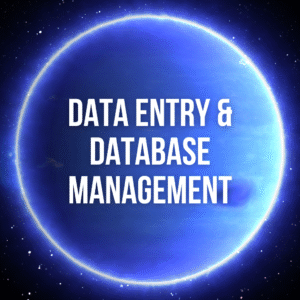Mastering Data Entry & Database Management: The Key to Business Accuracy, Efficiency, and Growth
In today’s fast-paced digital economy, businesses thrive on data. From financial transactions and customer interactions to market analytics and operational insights, data fuels every decision an organization makes. However, without proper management, even the most valuable data can become overwhelming, inaccurate, or simply unusable. This is where Data Entry and Database Management services step in—providing businesses with the foundation they need to operate efficiently, scale confidently, and grow sustainably.
This article will explore the importance of data entry, the role of database management, the challenges companies face without these services, and the transformational benefits of adopting professional solutions.
The Critical Role of Data in Business Success
Every business, regardless of size or industry, generates and consumes data daily. Whether it’s customer details, sales transactions, employee records, or inventory counts, this information must be captured, organized, and stored in a way that makes it accessible and actionable.
Without accurate data entry and effective database management, businesses risk making decisions based on incomplete or incorrect information, which can lead to financial loss, compliance issues, or missed opportunities. Simply put, data is only as valuable as the system that manages it.
What is Data Entry and Why Does It Matter?
Data entry is the process of collecting, recording, and inputting information into digital systems or databases. It includes tasks such as:
-
Inputting customer contact details into a CRM.
-
Recording invoices, receipts, and financial transactions.
-
Updating product listings on e-commerce platforms.
-
Entering survey or research data for analysis.
When done consistently and accurately, data entry creates an organized foundation that allows businesses to retrieve and analyze information quickly. This directly impacts operational efficiency, customer satisfaction, and overall growth.
The Importance of Database Management
While data entry ensures that information is captured, database management ensures that this information is structured, stored, and maintained for long-term use. Database management involves:
-
Organizing data into categories for easy access.
-
Ensuring data security and compliance.
-
Backing up and restoring data to prevent loss.
-
Updating records to maintain accuracy and relevance.
-
Supporting advanced reporting and analytics.
A well-managed database is like the central nervous system of a business—it connects all moving parts and ensures smooth communication across departments.
Challenges Businesses Face Without Proper Data Entry & Management
Many companies underestimate the importance of data entry and database management until problems arise. Some common challenges include:
-
Inaccuracy & Errors
Manual entry without checks leads to typos, missing fields, or duplicated records. -
Time Wastage
Teams spend hours searching for misplaced information instead of focusing on growth tasks. -
Lost Opportunities
Inaccurate customer data can lead to missed sales, poor service, and reduced trust. -
Compliance Risks
Failing to manage sensitive data properly can result in fines and reputational damage. -
Scalability Issues
Without organized systems, businesses struggle to expand operations efficiently.
Benefits of Professional Data Entry & Database Management Services
Investing in professional solutions offers businesses transformative benefits:
1. Accuracy & Reliability
Trained data entry specialists minimize errors, ensuring every record is complete and precise.
2. Time & Cost Efficiency
Outsourcing or automating data entry frees your in-house team to focus on strategy and revenue-generating activities.
3. Enhanced Decision-Making
Clean, structured, and accessible data empowers leaders to make informed business decisions.
4. Improved Customer Experience
With accurate databases, companies can personalize communications, anticipate customer needs, and build stronger relationships.
5. Scalability & Growth
As your business expands, scalable database systems can handle increasing volumes of data without disruption.
6. Data Security & Compliance
Professional management ensures sensitive data is stored securely and in line with regulations such as GDPR or HIPAA.
Real-World Applications Across Industries
Data entry and database management are not limited to one sector—they are essential across industries:
-
Real Estate: Managing property listings, client details, and MLS database updates.
-
Healthcare: Recording patient histories, lab results, and billing details.
-
Finance & Accounting: Inputting receipts, invoices, bank statements, and ledger entries.
-
E-commerce: Updating product catalogs, tracking inventory, and processing orders.
-
Education: Maintaining student records, grades, and attendance data.
-
Marketing: Managing campaign leads, email subscriber lists, and performance analytics.
No matter the industry, businesses that treat data as an asset always outperform those that neglect it.
How Outsourcing Data Entry & Database Management Works
Many companies choose to outsource these services to trusted providers like DataHome.Solutions, where skilled professionals handle the time-consuming tasks of inputting, verifying, and organizing data. The process typically involves:
-
Data Collection – Gathering raw data from physical documents, online forms, or digital sources.
-
Data Entry & Processing – Inputting information into spreadsheets, CRMs, or specialized software.
-
Quality Control – Double-checking entries for accuracy and consistency.
-
Database Structuring – Organizing data into accessible categories and formats.
-
Ongoing Management – Updating, securing, and maintaining the database for future use.
This streamlined process ensures businesses always have accurate, up-to-date, and reliable data.
Future of Data Entry & Database Management
As technology evolves, so do data entry and management practices. Automation, artificial intelligence, and cloud-based databases are transforming the field by reducing manual errors and improving scalability. Businesses that adopt these innovations will stay ahead of competitors while ensuring their data remains a valuable strategic asset.
Motivational Insight: Data as Your Growth Partner
Think of data as the silent partner in your business success. When managed correctly, it doesn’t just sit in files or spreadsheets—it drives sales, streamlines operations, builds trust, and unlocks growth opportunities.
Neglecting data entry and database management is like owning a luxury car but never fueling it. With the right systems in place, your business can run faster, smoother, and further than you ever imagined.
Conclusion: Empower Your Business with Data Excellence
In a world driven by information, businesses that prioritize Data Entry and Database Management set themselves apart. Accuracy, efficiency, and organization are no longer optional—they are essential for long-term success.
By investing in professional solutions, you’re not just managing data—you’re building a foundation for smarter decisions, stronger customer relationships, and sustainable growth.
At DataHome.Solutions, we specialize in providing businesses with reliable, accurate, and secure data entry and database management services, allowing you to focus on what matters most—growing your business with confidence.
Let DataHome.Solutions handle your data—so you can handle your growth.
Visit us for more details >
#VirtualAssistant #VirtualAssistance #DataEntry #DatabaseManagement #BusinessGrowth #DataSolutions #OutsourcingSuccess #DataAccuracy #DigitalTransformation












